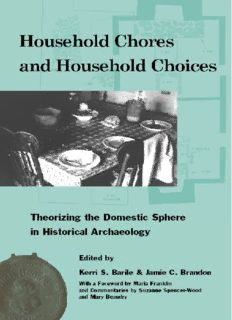
Household Chores and Household Choices: Theorizing the Domestic Sphere in Historical Archaeology PDF
Preview Household Chores and Household Choices: Theorizing the Domestic Sphere in Historical Archaeology
HOUSEHOLD CHORES and HOUSEHOLD CHOICES HOUSEHOLD CHOR ES and HOUSEHOLD CHOICES Theorizing the Domestic Sphere in Historical Archaeology Edited by KERRI S. BARILE and JAMIE C. BRANDON THE UNIVERSITY OF ALABAMA PRESS Tuscaloosa, Alabama Copyright © 2004 The University of Alabama Press Tuscaloosa, Alabama 35487–0380 All rights reserved Manufactured in the United States of America Typeface: Minion ∞ The paper on which this book is printed meets the minimum requirements of American National Standard for Information Science–Permanence of Paper for Printed Library Materials, ANSI Z39.48–1984. Library of Congress Cataloging-in-Publication Data Household chores and household choices : theorizing the domestic sphere in historical archaeology / edited by Kerri S. Barile and Jamie C. Brandon. p. cm. Includes bibliographical references and index. ISBN 0-8173-1395-8 (cloth : alk. paper) — ISBN 0-8173-5098-5 (pbk. : alk. paper) 1. United States—Antiquities. 2. Historic sites—United States. 3. Material culture—United States. 4. Landscape—Social aspects—United States—History. 5. Households—United States—History. 6. Family—United States—History. 7. Sex role—United States—History. 8. Archaeology and history—United States. 9. Feminist archaeology—United States. 10. Archaeology— Methodology. I. Barile, Kerri S. II. Brandon, Jamie C. E159.5.H68 2004 640′.973—dc22 2004001019 Contents List of Figures vii List of Tables ix Acknowledgments xi Foreword (Maria Franklin) xiii 1. Introduction: Household Chores; or, the Chore of De¤ning the Household 1 Jamie C. Brandon and Kerri S. Barile PART I. A SENSE OF PLACE 2. Analysis of Household and Family at a Spanish Colonial Rancho along the Rio Grande 15 Mindy Bonine 3. A Space of Our Own: Rede¤ning the Enslaved Household at Andrew Jackson’s Hermitage Plantation 33 Whitney Battle 4. Separate Kitchens and Intimate Archaeology: Constructing Urban Slavery on the Antebellum Cotton Frontier in Washington, Arkansas 51 Leslie C. Stewart-Abernathy 5. “Living Symbols of their Lifelong Struggles”: In Search of the Home and Household in the Heart of Freedman’s Town, Dallas, Texas 75 James M. Davidson vi / Contents PART II. A SENSE OF SPACE 6. Finding the Space Between Spatial Boundaries and Social Dynamics: The Archaeology of Nested Households 109 Nesta Anderson 7. Hegemony within the Household; The Perspective from a South Carolina Plantation 121 Kerri S. Barile 8. A Historic Pay-for-Housework Community Household: The Cambridge Cooperative Housekeeping Society 138 Suzanne Spencer-Wood 9. Fictive Kin in the Mountains: The Paternalistic Metaphor and Households in a California Logging Camp 159 Efstathios I. Pappas PART III. A SENSE OF BEING 10. The Ethnohistory and Archaeology of Nuevo Santander Rancho Households 179 Mary Jo Galindo 11. Reconstructing Domesticity and Segregating Households: The Intersections of Gender and Race in the Postbellum South 197 Jamie C. Brandon 12. Working-Class Households as Sites of Social Change 210 Margaret C. Wood PART IV. MAKING SENSE OF IT ALL: COMMENTARIES ON THE HOUSEHOLD 13. What Difference Does Feminist Theory Make in Researching Households? A Commentary 235 Suzanne Spencer-Wood 14. Doing the Housework: New Approaches to the Archaeology of Households 254 Mary C. Beaudry References 263 Contributors 307 Index 309 Figures 2.1.Map of Falcon Dam and Sites 41SR39 and 41SR43 19 2.2. Site 41SR39 20 2.3.Site 41SR43 21 2.4.Semirestored Galera Polychrome chocolatera vessel from Site 41SR39 23 2.5.Close-up of Spanish 2 real, dated 1778, recovered from Feature 6 at Site 41SR43 25 3.1.Hermitage Plantation, general map 35 3.2.Image of First Hermitage Site 36 3.3.East Cabin, feature map 46 4.1.Schematic of plan of two-room kitchens, Washington, Arkansas 64 4.2.The Sanders kitchen as reconstructed in 1994 65 4.3.Detached kitchen behind the Page House, detail from a 1907 photograph 65 4.4.Kitchen placement on the Block and Sanders urban farmsteads 67 5.1.1899 Sanborn Insurance Map of block of Juliette Street, Freedman’s Town, Dallas 87 5.2.African-American cosmetic compact: “High Brown Face Powder” (ca. 1911–1930) 103 7.1. Location of Middleburg Plantation and other sites discussed 125 7.2.Map of the current and historic cultural resources at Middleburg Plantation 127 7.3.The southern and eastern elevations of the Commissary 129 8.1. 1870 Cambridge, Massachusetts, directory map showing approximate locations of the CCHS cooperative and member households 147 9.1. Map of Soap Creek Pass, 1957 164 9.2.Plan drawing of three-man cabin at Soap Creek Pass 165 9.3. Plan drawing of a “T” family dwelling at Soap Creek Pass 166 viii / Figures 9.4. Plan drawing of assistant superintendent’s dwelling at Soap Creek Pass 168 9.5.Plan drawing of superintendent’s dwelling at Soap Creek Pass 170 10.1. Map of Nuevo Santander in the late eighteenth century illustrating the ranchos of Mier and other communities on the north bank of the Rio Grande 184 10.2. Part of the Juan Francisco Sáenz and Teresa Peña family 187 10.3. Part of the Miguel Sáenz and Gertrudis Hinojosa family 188 10.4. Map showing the porciones awarded in 1767 to the pobladores of Mier, Tamaulipas, Mexico 189 10.5.Part of the Manuel Angel Hinojosa and Juana Sanchez family 192 10.6. Part of the Ramón Guerra and Rosalia Hinojosa family 193 12.1.Map of Colorado showing location of Berwind 216 12.2.Pie chart showing national origin of residents of Berwind 217 12.3.Map showing households in pre-strike locus 219 12.4.Bar graph showing number of households with and without boarders 221 12.5.Pro¤le of midden feature 223 12.6.Bar graph showing increase in use of mass-produced canned goods in strata dating after 1907 224 12.7.Bar graph showing plain ceramics by functional category 229 Tables 3.1. Slave inventory from the Hermitage, 1846–1849 41 4.1.Slave ownership in Washington, Arkansas, 1850 and 1860 58 4.2.Slave demography in Washington, Arkansas, 1850 and 1860 59 5.1. 1900 Federal census enumeration for Juliette Street, Dallas, Texas (abridged) 90 5.2. Estimated square footage of residences on Juliette Street 96 5.3.Juliette Street stability of residence, 1901–1910 98 10.1. Amount of livestock owned per ranch according to the 1817 census data for Mier, Tamaulipas, Mexico 191
